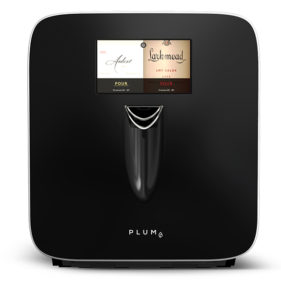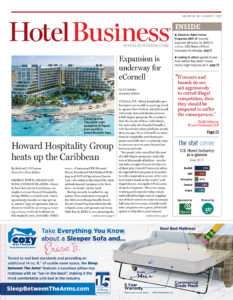DANIA BEACH, FL—Oftentimes, trips drive travelers to drink. Security lines, delayed flights and missed connections contribute to the traveler’s desire to take the edge off after finally opening the door to a guestroom. However, some travelers are too exhausted to walk back down to the lobby bar and others, not seeing what they want in the minibar (if there even is one), order room service—and hope they’re still awake by the time it arrives. One company has been pitching its wine-by-the-glass alternative to luxury and upscale properties domestically, claiming its product can transform the in-room guest experience, deliver new revenue streams and provide instant services recovery.
Before entering the commercial space, Plum first tackled challenges in the home with an appliance designed to automatically preserve, chill and serve wine by the glass. Many wine drinkers face similar problems when enjoying a glass or two at home, especially those who live alone (roughly 28% of households, according to the Census Bureau’s annual America’s Families and Living Arrangements table package). For wine drinkers in those households, opening a standard 750ml bottle is more often than not a waste—leaving the drinker in a predicament: drink the entire bottle or pour the rest down the drain.
“As a consumer, it was just really frustrating,” said David Koretz, founder and CEO of Plum. This continued annoyance eventually led him to develop Plum. The appliance works with any 750ml bottle, no matter the type of cork. There’s no need to remove the foil before dropping in the bottle. The 50-lb. appliance stores two bottles at a time, preserving each up to 90 days.
Within Plum is a motorized needle, which automatically pierces through the bottle’s closure while simultaneously extracting wine from the bottle and injecting argon gas to prevent oxidation, which degrades the wine. Each chamber’s HD camera enables the appliance to scan the wine label to identify varietal, vintage, region, winery and wine. Connected to the cloud, Plum analyzes data from several databases to find the right bottle. It uses this data to display winery images and video, and tasting notes on the appliance’s 7-in. touchscreen. Plum also uses the data to pinpoint the bottle’s ideal temperature, setting it accordingly.
While Plum’s business began on the consumer side, it’s been expanding, attempting to tackle the challenges within hospitality—the guestroom in particular. “Whether it’s true or not, the perception is it’s a ripoff, and it’s bad quality,” Koretz said about in-room wine. Wineries oftentimes don’t want their wines in guestrooms, he added, pointing out how wines aren’t typically preserved properly in guestrooms. This can result in the guest’s dissatisfaction with the wine, indirectly damaging the producer’s reputation.
Plum’s appliance sidesteps this issue for wineries with its built-in preservation system.
Initially pitching its product as a way for properties to generate more in-room revenue and sell more wine, Plum learned about other advantages from having the appliance in more than one guestroom. For instance, instead of sending up a bottle of wine to the guestroom to welcome the guest, the property can use Plum to unlock complimentary glasses of wine, with the addition of a personalized message from the hotel’s GM (this can all be done by integrating Plum with the property’s PMS).
Another way properties can use Plum is for services recovery. Maybe a guest is dealing with a noisy neighbor or some other kind of issue. While the issue is being resolved, the property can offer the guest a free glass of wine. “Now I can take a negative experience and turn it around before it’s a TripAdvisor review,” Koretz explained.
Sometimes, guests realize they want a glass of wine in the moment (what Plum has coined as “Plum Moments”). “Very few of us need a glass of wine,” he said. “But for the rest of us, if the opportunity strikes—like if we had a great night, there was a sunset and we could sit outside on the deck—we’ll have a glass. If not, we’ll go without.” It’s nearly impossible for properties to satisfy these unexpected moments when they’re restricted to their room service timeline or minibar.
While many brands are attempting to attract guests with the millennial mindset through initiatives promoting city exploration and lobby mingling (in an effort to move guests off the property and into the local community, which indirectly could impact Plum’s efforts), the company’s CEO isn’t buying into the hype. “I’m not convinced that the theory that everybody is looking to hang out in the lobby is actually true,” Koretz said. “I don’t think it’s true for millennials, and I don’t think it’s true for anybody else.” In his view, properties are trying to figure out what the next generation of travelers want, but as they implement new strategies, they, at times, “apply thinking to millennials that aren’t necessarily accurate,” he said, providing an example of how millennials are just as tired as any other age group when arriving to the guestroom after a long trip.
Plum has done deals with dozens upon dozens of properties already, the company’s CEO acknowledged. “We’ve literally done deals with almost every single luxury and upscale chain,” he said. “We just haven’t announced all of them.” Some of these hospitality companies include sbe Group, Hyatt, Hilton, Woodside Hotels and Marriott. The company this month will deploy appliances in 50 of the 200 guestrooms at the Four Seasons Hotel Silicon Valley at East Palo Alto, located in East Palo Alto, CA.
“The next few years are about scale,” Koretz said, who noted Plum currently only has deals in the U.S. “We look at the market as really being luxury and upper-upscale, which is about two million rooms in the U.S., about 850,000 in Western Europe and about 1.1 million in Asia—so there’s about four million rooms for us. That’s a really big business, and so our primary focus is on delivering against that market.”
Internationally, Plum is looking to expand to Western Europe and Asia—more specifically, Southeast Asia. Demand in this region has been high—partly due to the fact many of the travelers are coming from the U.S. and Europe. “I just got back. I was two weeks in Asia, and I would’ve loved to have a great glass of wine at night, and it’s just very hard to get,” he said. “There’s not a lot of education on it, and so everything from drinking it to serving it—it’s just not very polished yet. I think in our lifetime, China will produce world-class wine. There’s just enough geography there that it’s hard to imagine that they won’t find a region that will actually do great work.”
More recently, Plum raised a $9-million Series A funding round—led by Menlo Park, CA-based venture capital firm Khosla Ventures. Fort Lauderdale, FL-based early stage venture capital manager Las Olas Venture participated in the round, as did other angel investors across technology, wine and hospitality. Plum plans on using the financing to grow its consumer business as well as its expansion into the luxury hotel sector.
In addition to the funding, Plum has appointed hospitality industry veteran Joe Berger to its board of directors. He’s currently EVP and president of the Americas for Hilton Hotels & Resorts. In his current role, Berger is responsible for the operations functions of more than 350 corporately managed Hilton hotels and Hilton Grand Vacation resorts.
“We are seeing very strong interest from luxury and upscale hotels for Plum, as hoteliers are looking to deliver on-demand services that enhance the guest experience,” Koretz said. “This funding along with Joe’s expertise and insights into the hotel world will be essential as we move to become an industry standard.” HB


